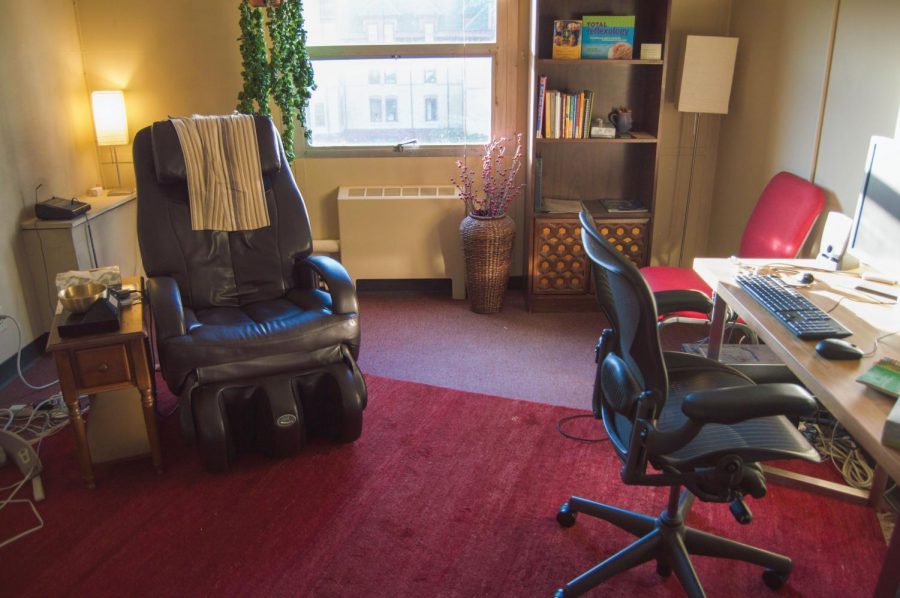Campus resources provide mental health support
March 5, 2018
Counseling & Psychological Services may have wait times, address emergencies first
Counseling and Psychological Services is not the only resource available on campus for students seeking support with mental health.
While wait times are possible for most students seeking individual counseling, CAPS works on a triage schedule which prioritizes individuals in higher risk situations, and will always get help immediately for students in an emergency situation, said Ian Kellems, director of CAPS.
Kellems said CAPS is the primary mental health agency on campus. It offers a wide range of services in order to help students figure out what type of support would be most helpful.
“Several years ago CAPS redesigned its services to increase ease of access, so now any student can come to CAPS without an appointment, Monday through Friday, 9 a.m. to 4 p.m., and meet with a counselor,” Kellems said in an email.
CAPS is a great place for students to make their initial appointment, said Kellems. From the Mind Spa to group counseling, different kinds of support services are offered which can help students regarding their mental health.
“CAPS is seeing 60 percent more students now than we were just five years ago. Keeping up with this ever-increasing demand is our greatest challenge as an agency,” Kellems said in an email. “It would be tempting to solve this challenge by drastically increasing student fees so that we could hire many more therapists, but we also understand how important it is to minimize the financial burden students experience.”
Kellems said that in an attempt to meet the increased need for students, CAPS is continually looking for innovative, cost-effective ways to help. Offering supports aside from individual therapy which students find helpful, including the mind spa relaxation room, drop-in meditation groups, workshops on emotional resilience, more than 20 therapy groups each term and online self-guided resources.
“For those students who need individual therapy, there unfortunately can be a waiting period, depending on the time in the term (later in the term usually means waiting longer), severity of issues (more severe issues are assigned a higher priority), and the student’s scheduling availability (limited availability usually means waiting longer),” Kellems said in an email.
Kellems said CAPS encourages students waiting to use all of the other CAPS supports (e.g., workshops, online resources, drop-in groups) as they prepare for participating in individual therapy. Students waiting for an individual therapy appointment are also encouraged to visit the drop-in clinic if they are in crisis and need immediate support.
Cassady Gilroy, an office manager at Diversity & Cultural Engagement, said that if the doors to the center are open then there is no wait time to come in and ask for support.
“Through our programs, initiatives, workshops, conversations, retreats and especially through our seven Cultural Resource Centers, we are here to welcome individuals and support their journeys in whatever way that means for that individual,” Gilroy said in an email.
Gilroy said an invisible component of anyone’s life is the internal struggles of their identity and the communities they are a part of, and those who do not have help with these struggles can have them affecting school and personal life. Through seven different cultural centers, Diversity & Cultural Engagement strives to help students discover who they are and identify communities they can be comfortable in, Gilroy added.
“CAPS is an amazing resource for students to have a real one on one interaction with a professional who can help guide them through their feelings,” Gilroy said in an email. “However, some students may instead need to have that peer-to-peer interaction to feel understood and not alone.”
DCE helps underrepresented identities find places where they specifically fit in, Gilroy said. For example, SOL is a student-fee funded organization that focuses on Queer and Trans People of Color while providing support through educational programming, student advocacy and ally building among undergraduate and graduate students, faculty, staff, and other organizations at Oregon State University. Gilroy said while this level of specificity can be difficult to find on-campus, they are kinds of resources that the DCE is continuously trying to develop.
“In regards to safety, this is both in a physical sense but also an emotional sense,” Gilroy said in an email. “Students that are struggling with identity issues for example, often can find themselves being judged even by the people closest to them. This is a setback to their development and personal level of safety which needs to be addressed. By using our resources, they can be assured that we would listen to whatever they need to say, without judgement and we would further support them in that moment.”
Judy Neighbours, director of the Survivor Advocacy and Resource Center said their office specifically provides confidential support services for students who have experienced gender based violence.
“So we provide initial points of contact when students want to disclose their experience of either sexual assault, dating violence or stalking,” Neighbours said in an email. “We provide crisis intervention, validation and support of their experience, helping connect them to needed additional services due to the impact of the violence; helping them understanding the reporting process and can accompany them if they do decide to report to either law enforcement or the university; and advocate for their needs.”
Kellems said many times students who come to CAPS can be best-served by other offices on campus like SARC and DCE when their challenges are more
situational than psychological.
“For those students who would like a referral to an off-campus therapist, CAPS also maintains an up-to-date database of 40 local providers whom we can refer students to,” Kellems said in an email.
























































































































